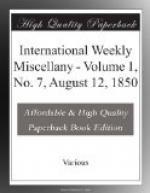At all events we must bear in mind, while reading or thinking over Miss Porter’s novels, that in her day, even the exaggeration of enthusiasm was considered good tone and good taste. How this enthusiasm was fostered, not subdued, can be gathered by the author’s ingenious preface to the, we believe, tenth edition of “Thaddeus of Warsaw.”
[Illustration]
This story brought her abundant honors, and rendered her society, as well as the society of her sister and brother, sought for by all who aimed at a reputation for taste and talent. Mrs. Porter, on her husband’s death, (he was the younger son of a well-connected Irish family, born in Ireland, in or near Coleraine, we believe, and a major in the Enniskillen Dragoons,) sought a residence for her family in Edinburgh, where education and good society are attainable to persons of moderate fortunes, if they are “well-born;” but the extraordinary artistic skill of her son Robert required a wider field, and she brought her children to London sooner than she had intended, that his promising talents might be cultivated. We believe the greater part of “Thaddeus of Warsaw” was written in London, either in St. Martin’s Lane, Newport Street, or Gerard Street, Soho, (for in these three streets the family lived after their arrival in the metropolis); though, as soon as Robert Ker Porter’s abilities floated him on the stream, his mother and sisters retired, in the brightness of their fame and beauty, to the village of Thames Ditton, a residence they loved to speak of as their “home.” The actual labor of “Thaddeus”—her first novel—must have been considerable: for testimony was frequently borne to the fidelity of its localities, and Poles refused to believe the author had not visited Poland; indeed, she had a happy power in describing localities. It was on the publication of Miss Porter’s two first works in the German language that their author was honored by being made a Lady of the Chapter of St. Joachim, and received the gold cross of the order from Wurtemberg; but “The Scottish Chiefs” was never so popular on the Continent as “Thaddeus of Warsaw”, although Napoleon honored it with an interdict, to




